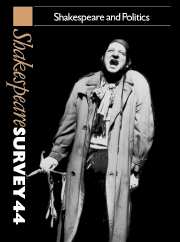Book contents
- Frontmatter
- Shakespeare and Politics
- Language, Politics, and Poverty in Shakespearian Drama
- Some Versions of Coup d’état, Rebellion and Revolution
- Woman, Language, and History in The Rape of Lucrece
- Love in Venice
- Two Kingdoms for Half-a-Crown
- ‘Fashion it thus’: Julius Caesar and the Politics of Theatrical Representation
- ’Demystifying the Mystery of State’: King Lear and the World Upside Down
- Tragedy, King Lear, and the Politics of the Heart
- The Politics of Shakespeare Production
- Shakespeare in the Trenches
- Shakespeare’s Earliest Editor, Ralph Crane
- Shakespeare’s Falconry
- Telling the Story of Shakespeare’s Playhouse World
- Shakespeare Performances in England, 1989–90
- Professional Shakespeare Productions in the British Isles January-December 1989
- Critical Studies
- Shakespeare’s Life, Times, and Stage
- Editions and Textual Studies
- Books Received
- Index
Shakespeare’s Life, Times, and Stage
Published online by Cambridge University Press: 28 March 2007
- Frontmatter
- Shakespeare and Politics
- Language, Politics, and Poverty in Shakespearian Drama
- Some Versions of Coup d’état, Rebellion and Revolution
- Woman, Language, and History in The Rape of Lucrece
- Love in Venice
- Two Kingdoms for Half-a-Crown
- ‘Fashion it thus’: Julius Caesar and the Politics of Theatrical Representation
- ’Demystifying the Mystery of State’: King Lear and the World Upside Down
- Tragedy, King Lear, and the Politics of the Heart
- The Politics of Shakespeare Production
- Shakespeare in the Trenches
- Shakespeare’s Earliest Editor, Ralph Crane
- Shakespeare’s Falconry
- Telling the Story of Shakespeare’s Playhouse World
- Shakespeare Performances in England, 1989–90
- Professional Shakespeare Productions in the British Isles January-December 1989
- Critical Studies
- Shakespeare’s Life, Times, and Stage
- Editions and Textual Studies
- Books Received
- Index
Summary
Proud in their numbers and secure in soul,
The confident and overlusty conservatives, revisionists, feminists etc.
Do the low rated new historicists play at dice . . .
In fact, the battle is well and truly joined. Howard Felperin’s The Uses of the Canon: Elizabethan and Contemporary Theory (Oxford, 1990) is a more-in-sorrow-than-in-anger attempt to convince the new historicists, and particularly Stephen Greenblatt, that they are fighting the wrong battle at the wrong time, with the wrong weapons: ‘The problem of relativism . . . looms large at a moment when the value of the humanities within an increasingly utilitarian and implicitly reactionary culture is in serious question’ (p. viii). Felperin describes himself as a deconstructionist and, being on ‘the left’, believes himself to share some of the ultimate values of those whose approach he finds limited and unsatisfactory, a form of fiddling while the humanities burn. Of Greenblatt’s reading of Marlowe in Renaissance Self-Fashioning (Chicago, 1980) he argues: ‘For all his Renaissance erudition, command of historical detail and local incident, and attentiveness to contemporary texts, it is his own culture Greenblatt broods on and depicts without realizing it’ (p. 121, my emphasis). This is condescending and misses a key tenet of much new historicist thinking, which is precisely that the 'construction' of history is irreducibly a product of the present and that any contemplation of the past is thus in part also an analysis of that present. His own conviction that these processes are dissoluble is most apparent in an engaging reading of The Tempest and Heart of Darkness as romances, in which he insists we must not fail to recognize that both are equally 'demystified': 'To do so is at once to underread the past by over-simplifying it and to overread the present by making it the locus of all complexity' (p. 34).
- Type
- Chapter
- Information
- Shakespeare Survey , pp. 224 - 244Publisher: Cambridge University PressPrint publication year: 1991

